LEADING LABORATORY QUALITY
LEADING LABORATORY QUALITY
LEADING LABORATORY QUALITY
Providing high-quality solutions for operational excellence and improved patient outcomes
Providing high-quality solutions for operational excellence and improved patient outcomes
Providing high-quality solutions for operational excellence and improved patient outcomes
CAP Ensures Enduring Quality for Laboratories and Patients
As the pandemic continued into 2021, the CAP remained undeterred in its commitment to provide high-quality solutions to laboratories in their continuous pursuit of operational excellence for improved patient outcomes. Unmatched resources in accreditation, proficiency testing/external quality assessment (PT/EQA), and quality management, all backed by the scientific expertise of CAP members, fortified laboratories as they navigated daily challenges further complicated by the pandemic. Laboratories in more than 100 countries rely on CAP laboratory quality solutions, giving them the confidence to meet any challenge.
The CAP Council on Scientific Affairs (CSA) and Council on Accreditation, along with numerous committees reporting to each council, continued to fuel the excellence of PT and accreditation programs.
More than 23,000 laboratories throughout the world count on CAP PT for providing high-quality and accurate patient testing. In 2021, the CAP launched 18 new PT programs that covered eight disciplines: anatomic pathology, molecular genetics, chemistry, hematology, microbiology, immunology, coagulation, and quality management tools.
The CAP continued to support laboratories with PT specifically for SARS-CoV-2. An additional program was added to the comprehensive offering of SARS-CoV-2 PT/EQA, covering molecular, serologic, and antigen testing.
The CAP’s accreditation programs, with nearly 8,000 laboratories accredited throughout the world, rely on the organization’s core Laboratory Accreditation Program, as well as programs for Biorepository, Reproductive, and Forensic Drug Testing, to achieve the highest standards of quality.
Complementing the accreditation programs, the CAP 15189 program covers the ISO 15189 international quality standard for medical laboratories. It includes the ISO 15189’s process orientation and management of systems, helping laboratories probe deeper into systemic issues, root cause(s), risk management, and ways to improve operational agility and efficiency.
In the 2021 edition of the CAP Accreditation Checklists (detailed in the next section), we expanded the requirements for a quality management program to move laboratories toward a quality management system (QMS) to align the Laboratory General Checklist with the requirements in the ISO 15189 standard. Along with the checklist revisions, the CAP developed and posted resource documents and examples in e-LAB Solutions Suite to help laboratories understand and implement the expanded QMS concepts. Further, we introduced new tools and CAP 15189 best practice complimentary education for all accreditation customers.
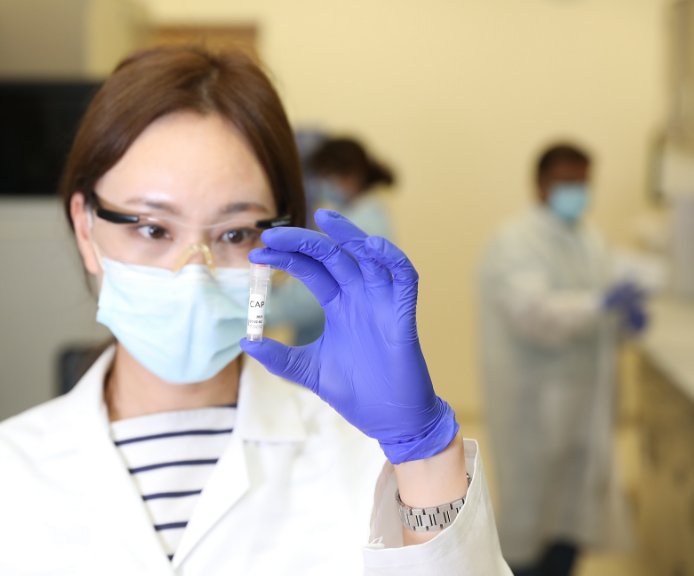
CAP Ensures Enduring Quality for Laboratories and Patients
As the pandemic continued into 2021, the CAP remained undeterred in its commitment to provide high-quality solutions to laboratories in their continuous pursuit of operational excellence for improved patient outcomes. Unmatched resources in accreditation, proficiency testing/external quality assessment (PT/EQA), and quality management, all backed by the scientific expertise of CAP members, fortified laboratories as they navigated daily challenges further complicated by the pandemic. Laboratories in more than 100 countries rely on CAP laboratory quality solutions, giving them the confidence to meet any challenge.
The CAP Council on Scientific Affairs (CSA) and Council on Accreditation, along with numerous committees reporting to each council, continued to fuel the excellence of PT and accreditation programs.
More than 23,000 laboratories throughout the world count on CAP PT for providing high-quality and accurate patient testing. In 2021, the CAP launched 18 new PT programs that covered eight disciplines: anatomic pathology, molecular genetics, chemistry, hematology, microbiology, immunology, coagulation, and quality management tools.
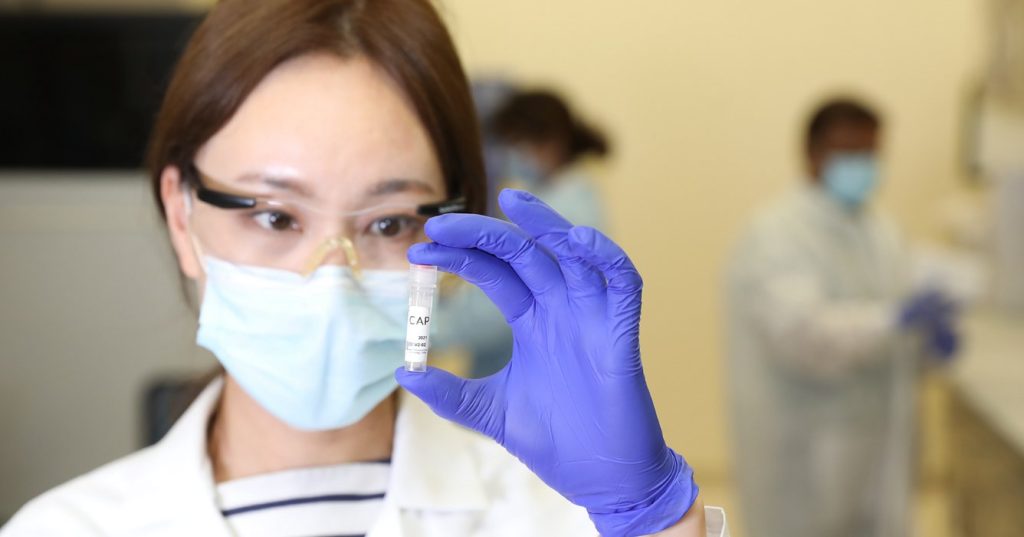
The CAP continued to support laboratories with PT specifically for SARS-CoV-2. An additional program was added to the comprehensive offering of SARS-CoV-2 PT/EQA, covering molecular, serologic, and antigen testing.
The CAP’s accreditation programs, with nearly 8,000 laboratories accredited throughout the world, rely on the organization’s core Laboratory Accreditation Program, as well as programs for Biorepository, Reproductive, and Forensic Drug Testing, to achieve the highest standards of quality.
Complementing the accreditation programs, the CAP 15189 program covers the ISO 15189 international quality standard for medical laboratories. It includes the ISO 15189’s process orientation and management of systems, helping laboratories probe deeper into systemic issues, root cause(s), risk management, and ways to improve operational agility and efficiency.
In the 2021 edition of the CAP Accreditation Checklists (detailed in the next section), we expanded the requirements for a quality management program to move laboratories toward a quality management system (QMS) to align the Laboratory General Checklist with the requirements in the ISO 15189 standard. Along with the checklist revisions, the CAP developed and posted resource documents and examples in e-LAB Solutions Suite to help laboratories understand and implement the expanded QMS concepts. Further, we introduced new tools and CAP 15189 best practice complimentary education for all accreditation customers.
CAP Ensures Enduring Quality for Laboratories and Patients
Unmatched resources in accreditation, proficiency testing/external quality assessment (PT/EQA), and quality management, all backed by the scientific expertise of CAP members, fortified laboratories as they navigated daily challenges further complicated by the pandemic.
As the pandemic continued into 2021, the CAP remained undeterred in its commitment to provide high-quality solutions to laboratories in their continuous pursuit of operational excellence for improved patient outcomes. Laboratories in more than 100 countries rely on CAP laboratory quality solutions, giving them the confidence to meet any challenge.
The CAP Council on Scientific Affairs (CSA) and Council on Accreditation, along with numerous committees reporting to each council, continued to fuel the excellence of PT and accreditation programs.
More than 23,000 laboratories throughout the world count on CAP PT for providing high-quality and accurate patient testing. In 2021, the CAP launched 18 new PT programs that covered eight disciplines: anatomic pathology, molecular genetics, chemistry, hematology, microbiology, immunology, coagulation, and quality management tools.
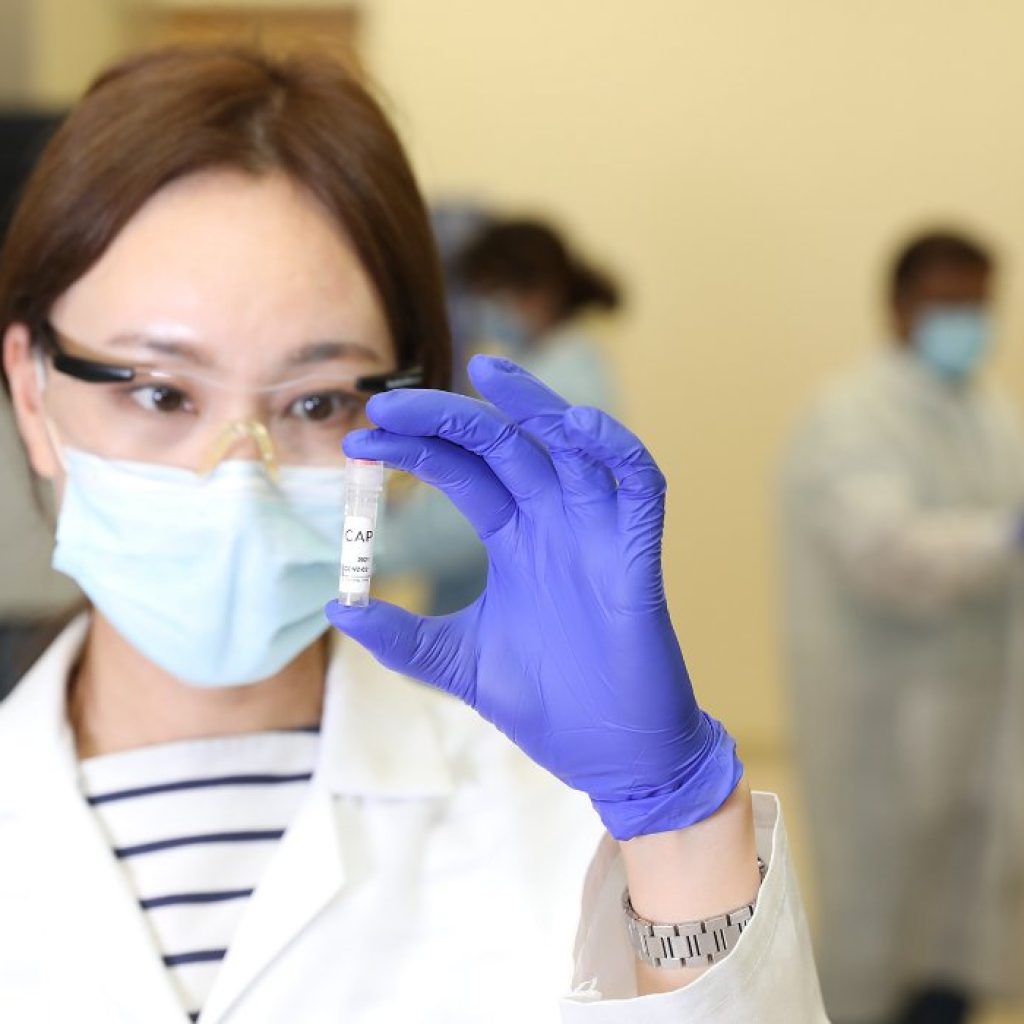
The CAP continued to support laboratories with PT specifically for SARS-CoV-2. An additional program was added to the comprehensive offering of SARS-CoV-2 PT/EQA, covering molecular, serologic, and antigen testing.
The CAP’s accreditation programs, with nearly 8,000 laboratories accredited throughout the world, rely on the organization’s core Laboratory Accreditation Program, as well as programs for Biorepository, Reproductive, and Forensic Drug Testing, to achieve the highest standards of quality.
Complementing the accreditation programs, the CAP 15189 program covers the ISO 15189 international quality standard for medical laboratories. It includes the ISO 15189’s process orientation and management of systems, helping laboratories probe deeper into systemic issues, root cause(s), risk management, and ways to improve operational agility and efficiency.
In the 2021 edition of the CAP Accreditation Checklists (detailed in the next section), we expanded the requirements for a quality management program to move laboratories toward a quality management system (QMS) to align the Laboratory General Checklist with the requirements in the ISO 15189 standard. Along with the checklist revisions, the CAP developed and posted resource documents and examples in e-LAB Solutions Suite to help laboratories understand and implement the expanded QMS concepts. Further, we introduced new tools and CAP 15189 best practice complimentary education for all accreditation customers.
Accreditation Checklists Advance Quality and Safeguard Patient Testing
With the annual release of the CAP Accreditation Checklists, the organization advances quality in laboratory medicine and safeguards patient testing with 21 discipline-specific checklists. The CAP deploys inspection teams, made up of pathologists and other laboratory experts, that use the checklists as a tool to monitor laboratory compliance with Centers for Medicare & Medicaid Services (CMS) regulations. The CAP is a CMS-approved accreditation organization with deeming authority to inspect laboratories under CLIA.
Further, the checklists aim to improve the quality of laboratory services and encourage implementation of risk reduction strategies while keeping laboratories current with changes in best practices.
In 2021, hundreds of CAP members working on scientific and accreditation committees scrutinized the checklists, as they do annually. The yearly review secures the checklists’ detailed rigor, as they are the roadmap for inspection and accreditation.
In the 2021 accreditation checklist edition, the CAP added 41 new requirements and revised 282 more, with the most significant changes in quality management, specimen collection and handling, antimicrobial susceptibility testing, and anatomic pathology. For example, based on recommendations for preanalytics and precision pathology published in the Archives of Pathology & Laboratory Medicine, the committees revised requirements impacting the preanalytic quality of specimens in the Laboratory General, All Common, Anatomic Pathology, and Molecular Pathology checklists to enhance the overall quality of specimens submitted for patient testing.
CAP laboratory quality solutions go beyond PT and accreditation. Cancer Protocols, biomarker templates, evidence-based guidelines, and technology vigilance further demonstrate the commitment to providing pathologists and laboratories resources to achieve excellence.
Accreditation Checklists Advance Quality and Safeguard Patient Testing
With the annual release of the CAP Accreditation Checklists, the organization advances quality in laboratory medicine and safeguards patient testing with 21 discipline-specific checklists. The CAP deploys inspection teams, made up of pathologists and other laboratory experts, that use the checklists as a tool to monitor laboratory compliance with Centers for Medicare & Medicaid Services (CMS) regulations. The CAP is a CMS-approved accreditation organization with deeming authority to inspect laboratories under CLIA.
Further, the checklists aim to improve the quality of laboratory services and encourage implementation of risk reduction strategies while keeping laboratories current with changes in best practices.
In 2021, hundreds of CAP members working on scientific and accreditation committees scrutinized the checklists, as they do annually. The yearly review secures the checklists’ detailed rigor, as they are the roadmap for inspection and accreditation.
In the 2021 accreditation checklist edition, the CAP added 41 new requirements and revised 282 more, with the most significant changes in quality management, specimen collection and handling, antimicrobial susceptibility testing, and anatomic pathology. For example, based on recommendations for preanalytics and precision pathology published in the Archives of Pathology & Laboratory Medicine, the committees revised requirements impacting the preanalytic quality of specimens in the Laboratory General, All Common, Anatomic Pathology, and Molecular Pathology checklists to enhance the overall quality of specimens submitted for patient testing.
CAP laboratory quality solutions go beyond PT and accreditation. Cancer Protocols, biomarker templates, evidence-based guidelines, and technology vigilance further demonstrate the commitment to providing pathologists and laboratories resources to achieve excellence.
Accreditation Checklists Advance Quality and Safeguard Patient Testing
With the annual release of the CAP Accreditation Checklists, the organization advances quality in laboratory medicine and safeguards patient testing with 21 discipline-specific checklists.
The CAP deploys inspection teams, made up of pathologists and other laboratory experts, that use the checklists as a tool to monitor laboratory compliance with Centers for Medicare & Medicaid Services (CMS) regulations. The CAP is a CMS-approved accreditation organization with deeming authority to inspect laboratories under CLIA.
Further, the checklists aim to improve the quality of laboratory services and encourage implementation of risk reduction strategies while keeping laboratories current with changes in best practices.
In 2021, hundreds of CAP members working on scientific and accreditation committees scrutinized the checklists, as they do annually. The yearly review secures the checklists’ detailed rigor, as they are the roadmap for inspection and accreditation.
In the 2021 accreditation checklist edition, the CAP added 41 new requirements and revised 282 more, with the most significant changes in quality management, specimen collection and handling, antimicrobial susceptibility testing, and anatomic pathology. For example, based on recommendations for preanalytics and precision pathology published in the Archives of Pathology & Laboratory Medicine, the committees revised requirements impacting the preanalytic quality of specimens in the Laboratory General, All Common, Anatomic Pathology, and Molecular Pathology checklists to enhance the overall quality of specimens submitted for patient testing.
CAP laboratory quality solutions go beyond PT and accreditation. Cancer Protocols, biomarker templates, evidence-based guidelines, and technology vigilance further demonstrate the commitment to providing pathologists and laboratories resources to achieve excellence.
CAP Streamlines Cancer Protocols and Data Standards
In June 2021, the CAP released three new and 87 revised Cancer Protocols. The three new protocols were: Prostate Needle Biopsy (Case Level), Prostate Needle Biopsy (Specimen Level), and Quantitative Immunohistochemistry (IHC). The release’s scope was the largest in recent years and leveraged a new Single Source Product authoring platform, streamlining production of the Cancer Protocols and electronic versions from a single database and thus ensuring better harmonization between versions.
Some release highlights included new World Health Organization histologic codes for the Bone/Soft Tissue, Gynecologic, and Thorax protocols and coordination with the American Joint Committee on Cancer to remove pTX and pNX stage classification reporting.
In 2021, the Cancer Committee began a new external review process with the CAP House of Delegates (HOD) to review new protocols and those with critical content updates to solicit user comments and feedback. Going forward, HOD engagement will be a standard component of the protocol development process, broadening opportunity for feedback.
The CAP continued to explore the use of protocol-driven standardized reporting beyond cancer through collaboration with the Pathology Electronic Reporting (PERT), Autopsy, and Cytopathology committees, as well as other committees and stakeholders. The goal is to identify other areas within the specialty that can benefit from reporting workflows and processes similar to those developed with the Cancer Protocols.
The CAP engages six major vendors as part of a program to ensure that pathologists can efficiently report their cancer cases no matter which laboratory information system (LIS) vendor they use. As more than 6,700 pathologists are now licensed to use the vendor-integrated Cancer Protocols for diagnostic cancer reporting, the program has become an essential part of CAP customer service. The vendor engagement program shines a renewed focus on real-time LIS software testing, validation of cancer protocol implementation and functionality, expanded committee member collaboration, and ongoing vendor education.
The CAP continued work on a Centers for Disease Control and Prevention grant to further address cancer reporting standardization, structure, and transmission using national health information technology standards. The initiative supports ongoing cancer protocol product development, including technical and functional improvements, pathologist and cancer registrar educational activities, and promotion of downstream data usage for quality reporting and surveillance activities.
CAP Streamlines Cancer Protocols and Data Standards
In June 2021, the CAP released three new and 87 revised Cancer Protocols. The three new protocols were: Prostate Needle Biopsy (Case Level), Prostate Needle Biopsy (Specimen Level), and Quantitative Immunohistochemistry (IHC). The release’s scope was the largest in recent years and leveraged a new Single Source Product authoring platform, streamlining production of the Cancer Protocols and electronic versions from a single database and thus ensuring better harmonization between versions.
Some release highlights included new World Health Organization histologic codes for the Bone/Soft Tissue, Gynecologic, and Thorax protocols and coordination with the American Joint Committee on Cancer to remove pTX and pNX stage classification reporting.
In 2021, the Cancer Committee began a new external review process with the CAP House of Delegates (HOD) to review new protocols and those with critical content updates to solicit user comments and feedback. Going forward, HOD engagement will be a standard component of the protocol development process, broadening opportunity for feedback.
The CAP continued to explore the use of protocol-driven standardized reporting beyond cancer through collaboration with the Pathology Electronic Reporting (PERT), Autopsy, and Cytopathology committees, as well as other committees and stakeholders. The goal is to identify other areas within the specialty that can benefit from reporting workflows and processes similar to those developed with the Cancer Protocols.
The CAP engages six major vendors as part of a program to ensure that pathologists can efficiently report their cancer cases no matter which laboratory information system (LIS) vendor they use. As more than 6,700 pathologists are now licensed to use the vendor-integrated Cancer Protocols for diagnostic cancer reporting, the program has become an essential part of CAP customer service. The vendor engagement program shines a renewed focus on real-time LIS software testing, validation of cancer protocol implementation and functionality, expanded committee member collaboration, and ongoing vendor education.
The CAP continued work on a Centers for Disease Control and Prevention grant to further address cancer reporting standardization, structure, and transmission using national health information technology standards. The initiative supports ongoing cancer protocol product development, including technical and functional improvements, pathologist and cancer registrar educational activities, and promotion of downstream data usage for quality reporting and surveillance activities.
CAP Streamlines Cancer Protocols and Data Standards
In June 2021, the CAP released three new and 87 revised Cancer Protocols—the largest release in recent years.
The three new protocols were: Prostate Needle Biopsy (Case Level), Prostate Needle Biopsy (Specimen Level), and Quantitative Immunohistochemistry (IHC). The release leveraged a new Single Source Product authoring platform, streamlining production of the Cancer Protocols and electronic versions from a single database and thus ensuring better harmonization between versions.
Some release highlights included new World Health Organization histologic codes for the Bone/Soft Tissue, Gynecologic, and Thorax protocols and coordination with the American Joint Committee on Cancer to remove pTX and pNX stage classification reporting.
In 2021, the Cancer Committee began a new external review process with the CAP House of Delegates (HOD) to review new protocols and those with critical content updates to solicit user comments and feedback. Going forward, HOD engagement will be a standard component of the protocol development process, broadening opportunity for feedback.
The CAP continued to explore the use of protocol-driven standardized reporting beyond cancer through collaboration with the Pathology Electronic Reporting (PERT), Autopsy, and Cytopathology committees, as well as other committees and stakeholders. The goal is to identify other areas within the specialty that can benefit from reporting workflows and processes similar to those developed with the Cancer Protocols.
The CAP engages six major vendors as part of a program to ensure that pathologists can efficiently report their cancer cases no matter which laboratory information system (LIS) vendor they use. As more than 6,700 pathologists are now licensed to use the vendor-integrated Cancer Protocols for diagnostic cancer reporting, the program has become an essential part of CAP customer service. The vendor engagement program shines a renewed focus on real-time LIS software testing, validation of cancer protocol implementation and functionality, expanded committee member collaboration, and ongoing vendor education.
The CAP continued work on a Centers for Disease Control and Prevention grant to further address cancer reporting standardization, structure, and transmission using national health information technology standards. The initiative supports ongoing cancer protocol product development, including technical and functional improvements, pathologist and cancer registrar educational activities, and promotion of downstream data usage for quality reporting and surveillance activities.
CAP Leads Development of Evidence-Based Guidelines
With three new guidelines released in 2021, the CAP’s Pathology and Laboratory Quality Center for Evidence-Based Guidelines (the Center) continues to lead in the development of high-quality clinical practice guidelines for pathologists and laboratories.
In a year when digital pathology was tested by the COVID-19 pandemic, the Center updated the 2013 “Validating Whole Slide Imaging for Diagnostic Purposes in Pathology” guideline. This timely work showed the equivalency of whole slide imaging to light microscopy and resulted in a more streamlined set of recommendations. The Center’s use of the Grading of Recommendations Assessment, Development and Evaluation approach (developed by the GRADE working group) and collaboration with two other professional societies means patients can be assured of this technology’s diagnostic accuracy.
“Laboratory Detection and Initial Diagnosis of Monoclonal Gammopathies” is the first comprehensive evidence-based guideline that focuses on optimizing sample selection and testing for the detection and measurement of M-proteins. Developed in collaboration with four other professional societies, the guideline recommendations encompass a wide variety of patient conditions and aim to reduce testing variability of patients with monoclonal gammopathies.
Finally, the Archives of Pathology & Laboratory Medicine accepted “Molecular Biomarker Testing for the Diagnosis of Diffuse Gliomas” for publication. The Center developed this guideline in collaboration with the American Association of Neuropathologists, the Association for Molecular Pathology, and the Society for Neuro-Oncology; it will be released in early 2022. The guideline establishes 13 recommendations to advise pathologists and treating physicians on the most appropriate methods, molecular biomarkers, and laboratory testing to include for optimal diagnosis, risk stratification, and prognosis.
The Center is committed to developing new guidelines that help pathologists and other medical professionals make informed decisions while also emphasizing the pathologist’s role in patient care.
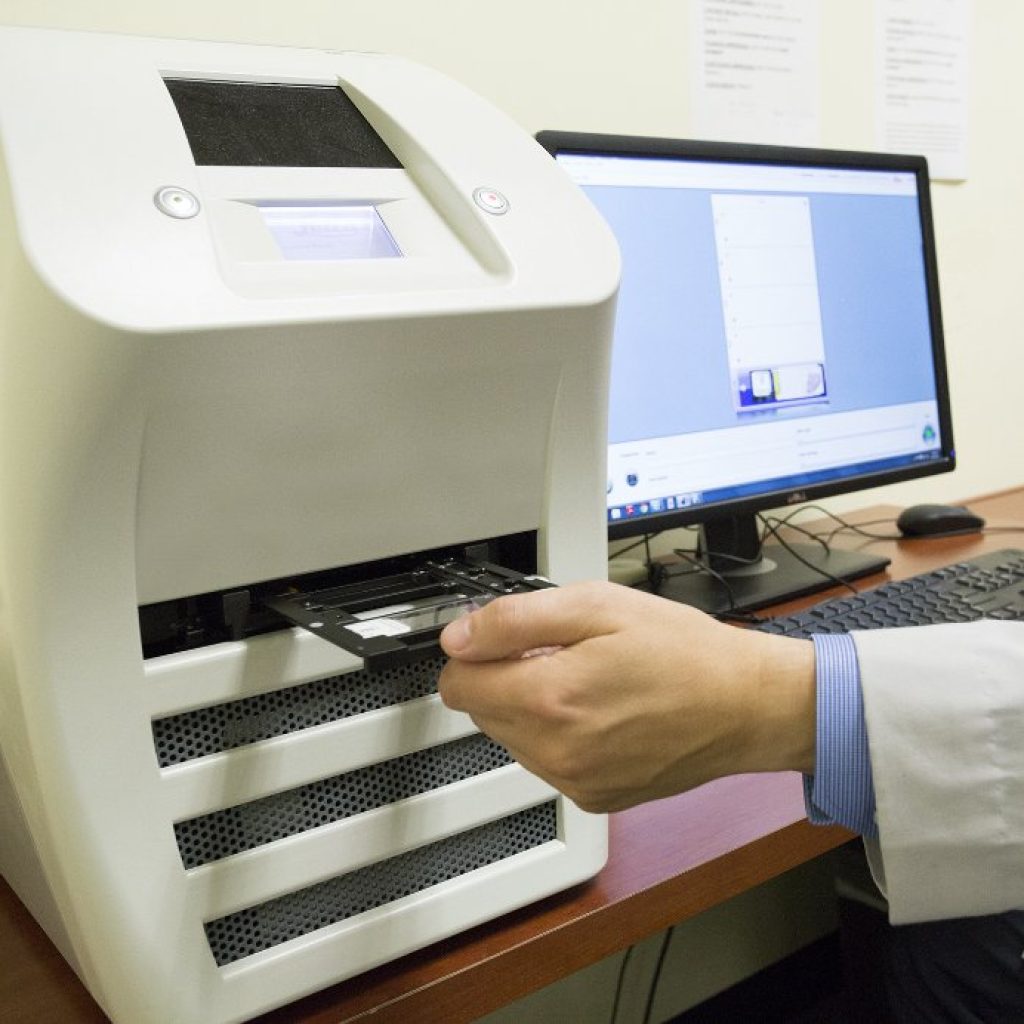
CAP Leads Development of Evidence-Based Guidelines
With three new guidelines released in 2021, the CAP’s Pathology and Laboratory Quality Center for Evidence-Based Guidelines (the Center) continues to lead in the development of high-quality clinical practice guidelines for pathologists and laboratories.
In a year when digital pathology was tested by the COVID-19 pandemic, the Center updated the 2013 “Validating Whole Slide Imaging for Diagnostic Purposes in Pathology” guideline. This timely work showed the equivalency of whole slide imaging to light microscopy and resulted in a more streamlined set of recommendations. The Center’s use of the Grading of Recommendations Assessment, Development and Evaluation approach (developed by the GRADE working group) and collaboration with two other professional societies means patients can be assured of this technology’s diagnostic accuracy.
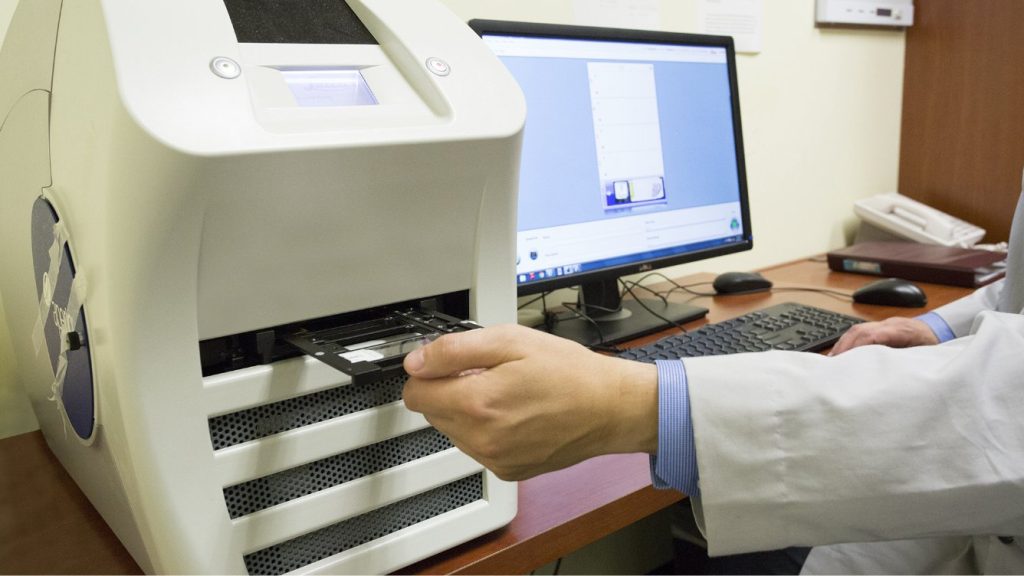
“Laboratory Detection and Initial Diagnosis of Monoclonal Gammopathies” is the first comprehensive evidence-based guideline that focuses on optimizing sample selection and testing for the detection and measurement of M-proteins. Developed in collaboration with four other professional societies, the guideline recommendations encompass a wide variety of patient conditions and aim to reduce testing variability of patients with monoclonal gammopathies.
Finally, the Archives of Pathology & Laboratory Medicine accepted “Molecular Biomarker Testing for the Diagnosis of Diffuse Gliomas” for publication. The Center developed this guideline in collaboration with the American Association of Neuropathologists, the Association for Molecular Pathology, and the Society for Neuro-Oncology; it will be released in early 2022. The guideline establishes 13 recommendations to advise pathologists and treating physicians on the most appropriate methods, molecular biomarkers, and laboratory testing to include for optimal diagnosis, risk stratification, and prognosis.
The Center is committed to developing new guidelines that help pathologists and other medical professionals make informed decisions while also emphasizing the pathologist’s role in patient care.
CAP Leads Development of Evidence-Based Guidelines
With three new guidelines released in 2021, the CAP’s Pathology and Laboratory Quality Center for Evidence-Based Guidelines (the Center) continues to lead in the development of high-quality clinical practice guidelines for pathologists and laboratories.
In a year when digital pathology was tested by the COVID-19 pandemic, the Center updated the 2013 “Validating Whole Slide Imaging for Diagnostic Purposes in Pathology” guideline. This timely work showed the equivalency of whole slide imaging to light microscopy and resulted in a more streamlined set of recommendations. The Center’s use of the Grading of Recommendations Assessment, Development and Evaluation approach (developed by the GRADE working group) and collaboration with two other professional societies means patients can be assured of this technology’s diagnostic accuracy.
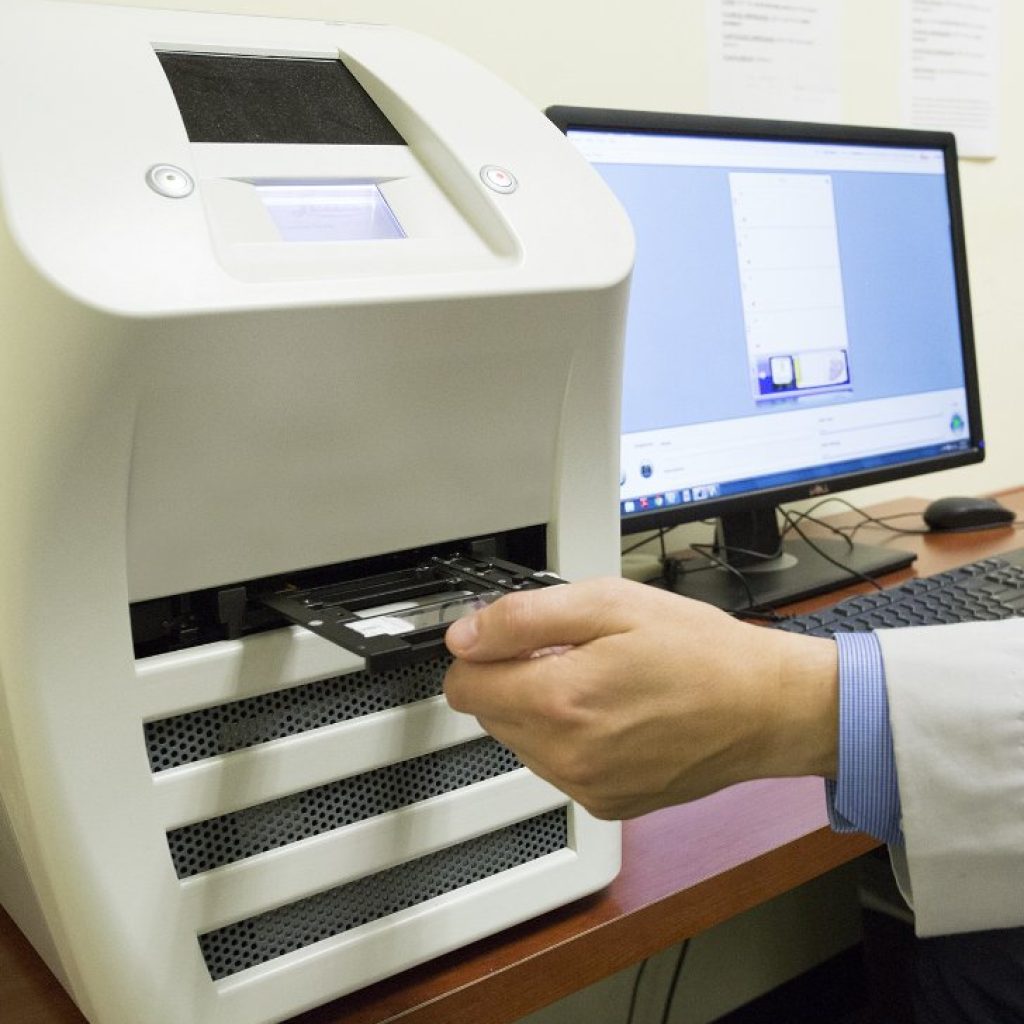
“Laboratory Detection and Initial Diagnosis of Monoclonal Gammopathies” is the first comprehensive evidence-based guideline that focuses on optimizing sample selection and testing for the detection and measurement of M-proteins. Developed in collaboration with four other professional societies, the guideline recommendations encompass a wide variety of patient conditions and aim to reduce testing variability of patients with monoclonal gammopathies.
Finally, the Archives of Pathology & Laboratory Medicine accepted “Molecular Biomarker Testing for the Diagnosis of Diffuse Gliomas” for publication. The Center developed this guideline in collaboration with the American Association of Neuropathologists, the Association for Molecular Pathology, and the Society for Neuro-Oncology; it will be released in early 2022. The guideline establishes 13 recommendations to advise pathologists and treating physicians on the most appropriate methods, molecular biomarkers, and laboratory testing to include for optimal diagnosis, risk stratification, and prognosis.
The Center is committed to developing new guidelines that help pathologists and other medical professionals make informed decisions while also emphasizing the pathologist’s role in patient care.
CAP Stays Abreast of Changing Technology
As technology constantly changes, the CAP remains vigilant in preparing and educating members and customers for any impacts on pathology and laboratory medicine. Members serving on committees are charged with disseminating information and developing tools and resources for the pathology and laboratory medicine community.
In 2021, the CAP continued to position itself as a resource for artificial intelligence (AI) in pathology with the formation of the AI Committee. The committee will explore AI ethics, prepare the specialty for AI through the development of PT and education work products, and position the CAP and pathologists as subject matter experts and leaders in regulatory activities.
The Informatics Committee continues to provide both leadership and expertise in the development of the US Food and Drug Administration’s “SHIELD” (Standardization of Lab Data to Enhance Patient-Centered Outcomes Research and Value-Based Care) initiative, which is focused on improving the quality, utility, and portability of electronic laboratory in vitro diagnostic data through harmonized implementation of semantic data standards. In addition, the Informatics Committee launched its Informatics Case-Based Education Program.
The Digital and Computational Pathology Committee explored pathologists’ interests and concerns regarding making the remote sign-out waiver permanent once the COVID-19 national emergency is declared over. Additionally, because of the pandemic, the committee will continue to investigate CAP-accredited laboratories’ interests in implementing digital pathology technologies.
CAP Stays Abreast of Changing Technology
As technology constantly changes, the CAP remains vigilant in preparing and educating members and customers for any impacts on pathology and laboratory medicine. Members serving on committees are charged with disseminating information and developing tools and resources for the pathology and laboratory medicine community.
In 2021, the CAP continued to position itself as a resource for artificial intelligence (AI) in pathology with the formation of the AI Committee. The committee will explore AI ethics, prepare the specialty for AI through the development of PT and education work products, and position the CAP and pathologists as subject matter experts and leaders in regulatory activities.
The Informatics Committee continues to provide both leadership and expertise in the development of the US Food and Drug Administration’s “SHIELD” (Standardization of Lab Data to Enhance Patient-Centered Outcomes Research and Value-Based Care) initiative, which is focused on improving the quality, utility, and portability of electronic laboratory in vitro diagnostic data through harmonized implementation of semantic data standards. In addition, the Informatics Committee launched its Informatics Case-Based Education Program.
The Digital and Computational Pathology Committee explored pathologists’ interests and concerns regarding making the remote sign-out waiver permanent once the COVID-19 national emergency is declared over. Additionally, because of the pandemic, the committee will continue to investigate CAP-accredited laboratories’ interests in implementing digital pathology technologies.
CAP Stays Abreast of Changing Technology
As technology constantly changes, the CAP remains vigilant in preparing and educating members and customers for any impacts on pathology and laboratory medicine. Members serving on committees are charged with disseminating information and developing tools and resources for the pathology and laboratory medicine community.
In 2021, the CAP continued to position itself as a resource for artificial intelligence (AI) in pathology with the formation of the AI Committee. The committee will explore AI ethics, prepare the specialty for AI through the development of PT and education work products, and position the CAP and pathologists as subject matter experts and leaders in regulatory activities.
The Informatics Committee continues to provide both leadership and expertise in the development of the US Food and Drug Administration’s “SHIELD” (Standardization of Lab Data to Enhance Patient-Centered Outcomes Research and Value-Based Care) initiative, which is focused on improving the quality, utility, and portability of electronic laboratory in vitro diagnostic data through harmonized implementation of semantic data standards. In addition, the Informatics Committee launched its Informatics Case-Based Education Program.
The Digital and Computational Pathology Committee explored pathologists’ interests and concerns regarding making the remote sign-out waiver permanent once the COVID-19 national emergency is declared over. Additionally, because of the pandemic, the committee will continue to investigate CAP-accredited laboratories’ interests in implementing digital pathology technologies.
LIVING OUR QUALITY MISSION
23,702
laboratories using
CAP PT
1,291
pathologists participating
in on-site inspections*
7,912
CAP-accredited laboratories
2,166
accreditation inspections performed
*On-site inspections limited in 2021 due to COVID-19
LIVING OUR QUALITY MISSION
23,702
laboratories using CAP PT
1,291
pathologists participating in on-site inspections*
7,912
CAP-accredited laboratories
2,166
accreditation inspections performed
*On-site inspections limited in 2021 due to COVID-19
LIVING OUR
QUALITY MISSION
23,702
laboratories using CAP PT
1,291
pathologists participating
in on-site inspections*
7,912
CAP-accredited laboratories
2,166
accreditation inspections performed
*On-site inspections limited in 2021 due to COVID-19